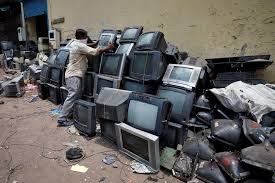Kathmandu: Nepal produces 25,000 tons of electronic waste annually. According to a study, 3,500 tons of electronic waste is produced daily.
A study conducted with the participation of Nepal Institute of Science and Technology has shown that old and damaged CRT desktops, CRT televisions, washing machines, laptops, LCD televisions and mobiles, battery telephones and electric fuses are prevalent in the Kathmandu Valley.
Experts say that the risk of electronic waste is more challenging in Nepal where industrial and domestic waste is not managed. Due to the increasing use of electronic materials and its lack of proper management, the risk of increasing electronic waste is increasing. Jyoti Giri explains.
Giri said the lack of regulatory regulation of electronic materials, which were widely used in the past, could lead to major problems in the future.
“Right now, five percent of the total waste in our country is electronic waste. The garbage that comes now is because of the low electrical content used in the past. As the use of such materials has increased in recent times, it will increase significantly from five per cent in the future, ‘she said. She said that recycling of such materials should also be taken into consideration.
He concludes that the treatment and management of electronic waste will not be possible from the current situation and mechanism as it will be special. He said that lack of proper management of such obsolete devices and equipments could have serious environmental impact.
Electrical waste also contains harmful acids in batteries. Not only that, precious metals are also mixed in this waste. As much as it affects the garbage when not managed, the financial benefits can be taken while managing. She explains.
‘Such waste also contains harmful substances like acid in the battery. Whose management is extremely necessary. The same waste contains precious metals, such as gold, silver, and platinum. So it creates another economic cycle. The government should work on everything from study and research to managing the plant, ‘she said.
He said that there have been some management efforts from the private sector in Nepal but the government has not shown much interest.
The use of electronic materials, which has expanded in the last decade, will come as garbage in the next decade. Former Minister for Science and Technology Ganesh Sah has said that failure to take necessary steps for management in this decade will be a serious problem.
“There is no policy in Nepal so far to control such waste. The government needs to regulate it systematically to address this new threat to the environment,” he said.
Sah says that the polluters should be made responsible for the management of such waste and the fee should be collected from them. “Is it possible to go for the same model as petrol tax?” He says.
The Department of Environment, which is in charge of environmental protection, has also said that no concrete work has been done for e-waste management so far.
Deputy Director General of the Department Indubikram Joshi said that even though he was aware of it, he was still busy in the management of industrial waste.
“We have the information for e-waste management, but we have not made any separate policy for that,” he said. We have not done enough research on this, “he said.” Now is the time for us to move forward. ‘
A study was conducted by the Nepal Telecommunication Authority (NTA), the regulator of the telecommunications sector, to make necessary legal arrangements for the management of electronic waste in Nepal. NEA has also recommended to the government to make a law based on the study done a few years ago.
NTA spokesperson Min Prasad Aryal said that a proposal has been sent to the government for a legal framework. However, the government has not been able to complete it so far. He said that the share of electronic waste in the waste generated is certain to increase.
